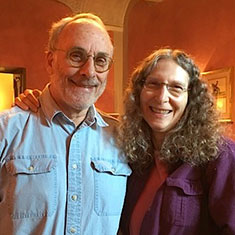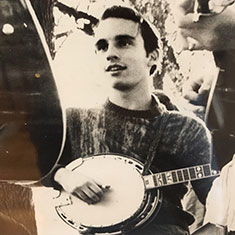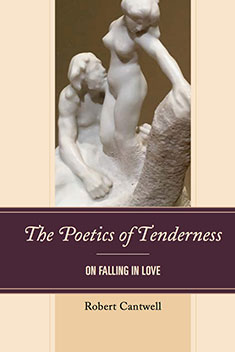Alumnus, retired English professor sings virtues of humanities education
Apr. 2, 2018 — Robert Cantwell ’66 said his education had not really begin until he set foot on the Grinnell College campus in 1962.
“I had an inadequate public education on the south side of Chicago, so I frankly didn’t have much of a feeling for what education meant,” he says. “My first hours at Grinnell were transformative. The notion that one ought to be something other than what you expected to be hit me quickly.”
Education, particularly in the humanities, remained an important facet in Cantwell’s life for the next half century. He is a professor emeritus of American studies and English at the University of North Carolina, the author of several books, and a scholar in the fields of folklife and bluegrass music.
 Robert Cantwell '66 and
Robert Cantwell '66 and
Lydia Wegman
In June, Cantwell and his wife, Lydia Wegman, made a donation to the Grinnell College Center for the Humanities.
Cantwell worries about the humanities. The discipline in which he built his career often is embattled these days, he says. Some state legislatures are attempting to move higher education in a vocational direction.
“They don’t have an understanding of what the humanities are and what they achieve,” Cantwell says. “It’s difficult to articulate what a humanities education offers. It’s difficult because its aims are subtle. I see the humanities as a way to develop the citizen, enlarge the appreciation of life, and for me as an English professor, to teach a reader and listener to know the difference between truth and falsehood.”
Since 2001, the Center for the Humanities has advocated for the essential role of humanistic and interdisciplinary inquiry in Grinnell’s liberal arts mission. The Center supports faculty scholarship, cosponsors events across campus, contributes to community organizations, and puts on a diverse slate of programming each year.
Cantwell and Wegman traveled from North Carolina to Grinnell the first week of March and attended a Center for the Humanities presentation by Gary Tomlinson of Yale University about humanistic activism.
“Bob and Lydia’s visit was a great opportunity to share Grinnell’s intellectual community with them,” says Caleb Elfenbein, director of the Center for the Humanities and an associate professor in history and religious studies. “Moving forward, I really look forward to speaking with them as the Center considers how to put their generous donation to work in a way that will honor their interests and goals. I know they care deeply about the value of literature and public humanities. I imagine their gift enabling programming that combines those interests in some way.”
 Cantwell playing the banjo.
Cantwell playing the banjo.
Taken in 1969.
Cantwell majored in English at Grinnell College and went on to earn a Master of Arts in English from the University of Chicago in 1967 and a Ph.D. in English from the University of Iowa in 1971. Cantwell’s 45 years of teaching career began at Kenyon College and continued at Exeter University, Georgetown, and the University of Iowa, before concluding at UNC.
When they first moved to Chapel Hill more than 20 years ago, Cantwell frequented a local coffee shop. He felt an immediate affinity with the owner, but it wasn’t until a couple of additional visits that they realized both were Grinnellians.
“There’s something that this place imparts that can be recognized,” Cantwell said. “I’m not sure what it is exactly. Grinnell graduates have a natural affinity for one another.”
Cantwell is the author of several books, including Bluegrass Breakdown: The Making of the Old Southern Sound, Ethnomimesis: Folklife and the Representation of Culture, and When We Were Good: The Folk Revival. Cantwell returned to Grinnell College in the late 1990s to give a talk about his books. Several of his former professors attended his lecture.
“For me that was sort of my triumphant return to my alma mater,” Cantwell says while laughing. “I was a banjo player at Grinnell at the beginning of the folk music revival. I incurred any number of dormitory fines playing the banjo after hours.”
Cantwell’s newest book is The Poetics of Tenderness: On Falling in Love.
 Cover - The Poetics of
Cover - The Poetics of
Tenderness: On Falling in Love
“If you look at it against the backdrop of my other books in folk music, vernacular culture, and cultural theory, it seems like a departure, but it isn’t really,” Cantwell says. “Love is the overwhelming preoccupation of English authors, so you can’t not think about it as an English professor.”
The book looks closely at two novels, Great Expectations and Lolita. Cantwell reaches across disciplines to biology, literature, attachment theory, and aesthetics, as well as the work of British psychologist Donald Winnicott. The aim of the book is to turn the current conversation about love away from predation, exploitation, and violence toward affection, nurture, intimacy, and tenderness.
Though Cantwell is still thinking about his next writing project, retirement is treating him well. He and Wegman visit their grandchildren and grandnephews frequently. For his 70th birthday, Wegman bought him a mandolin, which he is learning how to play.
“I don’t deserve the instrument, but I love playing it,” he says.
- by Jeremy Shapiro
For your information:
The 2017-2018 theme for the Grinnell College Center for the Humanities is The Politics of Human Thriving. Learn more about the Center.